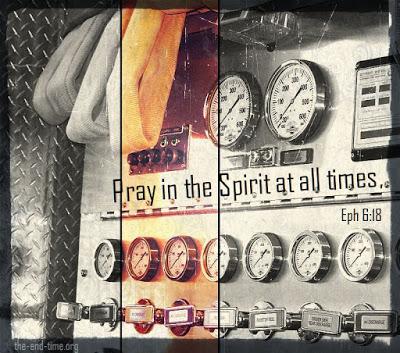Prayer straddles our lives both on earth and in heaven. All week I'm focusing on prayer. It's important. I need to do better in my life, and I can't imagine a Christian who doesn't think they can do better at prayer either.
Last weekend, I was thinking of one of Spurgeon's sermons, called God’s Providence. (#3114). Spurgeon likened the cherubim’s acts near the throne and the wheels within wheels as described by Ezekiel as machinery of Providence. He described, hypothetically of course, the wheels going up and down and left and right in tandem as the machinery of Providence carrying out God’s will and decrees. It’s an interesting thought, and Spurgeon is vivid about his descriptions.
This series of 'prayer machinery of heaven' is inspired by that thought.
Please enjoy this scripture photo I made of the machinery of prayer. Under that will be some further resources on prayer suggestions. Monday I suggested praying for the persecuted and missionaries around the world, with some resources to check out along those lines. Tuesday I suggested praying for our elders (pastors, deacons, teachers, etc), again, with resources. Wednesday I suggested praying for each other. Today focuses on how often to pray.
In an article called Pray Like a Puritan, Tim Challies interviewed Dr Joel Beeke. Here is an excerpt of their conversation as it relates to frequency of prayer:
TC: Matthew Henry wrote a very popular book on prayer and among his first directions was "begin each day with God." What might the Puritans have said if someone suggested that the Bible does not command daily devotions or daily private worship?
JB: Manton said, "Though there be not an express rule particularly set down how often we should be with God," yet God’s commands and calls to prayer "are very large." He pointed out that the Word commands us to "pray without ceasing" (1 Thess. 5:17) and to be "praying always" (Eph. 6:18). This implies a continual habit of prayer, and also set times especially devoted to prayer. He offered us the examples of David (Ps. 55:17) and Daniel (Dan. 6:10), both of whom prayed three times a day. It is true that we can shoot up sudden prayers (Neh. 2:4) in the middle of our ordinary work. But we must also "strive" in prayer (Rom. 15:30), which implies a longer time given exclusively to prayer. Some of those longer prayer times are with the family or with the church, but Christ taught us especially to pray alone in a secret place (Matt. 6:6), and in that same context to pray "daily" (Matt. 6:11). We should not view prayer as a mere religious performance, asking, "How often do I have to do it?" Instead, Manton said that prayer is the conversation of "a loving soul with God," and "acts of friendship and communion must not be rare and unfrequent, but constant and often." He wrote, "If we have a love to God, we cannot keep long out of God's company, but will be with him pouring out our hearts to him."

Further Resources
GotQuestions: How to Pray?
Evangelical Times: John Bunyan on Prayer
Meet The Puritans: John Bunyan on Prayer
